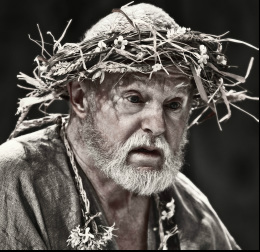 Image: Johan Persson
Image: Johan Persson To describe King Lear as moving verges on the asinine. Yet such an adjective seems inevitable when recalling the 2010 performance of Derek Jacobi at the Donmar Warehouse. The collective silence before the acclamation of the curtain call, attended by non-gender specific post-tragic weeping, wiping of eyes and sniffling, was human evidence that the fate of an impetuous monarch and his beguiled courtier who are betrayed by their progeny can touch our deeper emotions. It was the closest experience to a collective Aristotelian catharsis I have encountered.
There was one other element that stood out in Michael Grandage’s production. When Goneril complains to Regan of the increasingly alarming behaviour of their recently retired father and his riotous retinue in Act One, Scene Three – the subject of a discussion with her sister and the King later in the play – she engaged the sympathy of critics and audience alike. Both saw concern about the disturbing and errant ways of a parent, with fears that matters could only degenerate. They did and they do.
This was truly an evocation of mystic disintegration. Ripeness was all.
There was one other element that stood out in Michael Grandage’s production. When Goneril complains to Regan of the increasingly alarming behaviour of their recently retired father and his riotous retinue in Act One, Scene Three – the subject of a discussion with her sister and the King later in the play – she engaged the sympathy of critics and audience alike. Both saw concern about the disturbing and errant ways of a parent, with fears that matters could only degenerate. They did and they do.
This was truly an evocation of mystic disintegration. Ripeness was all.
 RSS Feed
RSS Feed
